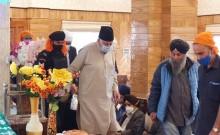The Supreme Court on Monday adjourned the hearing of 1993 Mumbai blasts convict Yakub Memon's plea challenging his death warrant and seeking stay on his execution scheduled on 30 July till Tuesday.
The apex court took up Memon's petition in which he has claimed that he was awarded death penalty even before he exhausted all the legal remedies available to him. Attorney general Mukul Rohatgi, however, told the SC that he has utilised all his legal options.
Rohtagi told the court that after Memon's mercy plea was rejected he was asked to file his curative petition within a week. "We couldn't have waited for five years for Yakub to file a curative petition," the Hindustan Times quoted Rohtagi as saying.
Rohtagi appeared for the Centre, while Raju Ramachandran represented Memon.
Just in: Hearing on Yakub Memon's writ petition challenging his death penalty adjourned till tomorrow in the Supreme Court @utkarsh_aanand
— The Indian Express (@IndianExpress) July 27, 2015
In the petition, Memon has claimed that the special Tada court in Mumbai awarded him death penalty even before he had utilised all the legal remedies, which is not in compliance with the law. He therefore also sought quashing of his hanging, scheduled on 30 July.
When the Tada court issued the death warrant, Memon's curative petition was pending with the Supreme Court, he has claimed in the petition. The petition further says that his hanging on Thursday will be against the law as he has appealed for mercy from the Governor of Maharashtra, the reply to which is still awaited.
Earlier in 2015, the SC had quashed capital punishment of two death row convicts in a multiple-murder case on the grounds that it was illegal as procedure was not followed. It now remains to be seen if the apex court takes a similar stand in Memon's case.
Memon had on Tuesday submitted his second mercy plea with Maharashtra Governor C Vidyasagar Rao, immediately after the SC rejected his curative petition seeking commutation of his death sentence to life imprisonment.
The 1993 serial Mumbai bomb blasts convict had earlier filed one mercy plea with the President, which was consequently rejected.
Politicians, jurists' joint mercy petition to President
Several politicians, former judges and lawyers have also come out in defence of Memon and filed a mercy petition with President Pranab Mukherjee, requesting him to commute his death sentence to life term.
The petition has been signed by CPI-M chief Sitaram Yechury, party leader Prakash Karat, CPI's D Raja, Congress's Mani Shankar Aiyar, BJP's Shatrughan Sinha, retired Supreme Court judges HS Bedi and PB Sawant, jurist Ram Jethmalanai, advocate Prashant Bhushan, actor Naseeruddin Shah, filmmaker Mahesh Bhatt and social activist Tushar Gandhi.
The petitioners have highlighted certain factors on which the SC had "applied a different yardstick to Yakub Memon", NDTV reports.
The petition also says that the top court commuted death sentence of 10 others accused of planting bombs, while Memon's was rejected. Memon was awarded death penalty for arranging finances for carrying out the 13 serial explosions across Mumbai on 12 March, 1993, in which 257 people were killed and over 700 were injured.
"In comparison to Yakub Memon, the 10 co-accused persons planted the bombs and played a much more critical and direct role in the actual execution of the conspiracy," the petition reads.
The petition also says Memon is suffering from schizophrenia and recalls an SC ruling wherein it said that a convict in such a state should not be hanged. The petition also says that Memon's lawyer could not attend the hearing, in which he was sentenced to death as it was held without due notice.
"We believe that Yakub Memon is guilty and needs to be punished. But, we want his death sentence to be commuted to a life sentence," Sitaram Yechury said.
The move came after Rediff.com published an article, dated 2007, written by B Raman, a former additional secretary in the Union cabinet secretariat and former head of counter-terrorism division of the R&AW, who died in 2013.
The article -- sent in the form of an e-mail to journalist Sheela Bhatt in 2007 -- said that Yakub "does not deserve to be hanged" after all the cooperation and assistance he offered to Indian intelligence in unearthing Pakistan's role in 1993 Mumbai bombings and bringing back a few other members of his family to India, which he said were the mitigating factors which were not highlighted at the court.
"I was disturbed to notice that some mitigating circumstances in the case of Yakub Memon and some other members of the family were probably not brought to the notice of the court by the prosecution and that the prosecution did not suggest to the court that these circumstances should be taken into consideration while deciding on the punishment to be awarded to them. In their eagerness to obtain the death penalty, the fact that there were mitigating circumstances do not appear to have been highlighted," he had written.
If these mitigating factors had been brought to the notice of the court, Memon might not have been awarded death sentence, Raman believed.

















